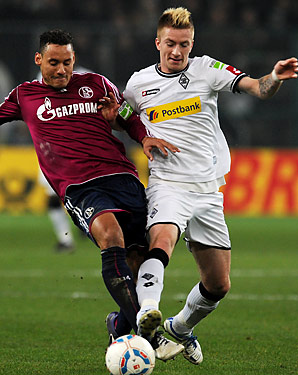Dortmund's capture of Marco Reus leaves Bayern with sour grapes
As the richest and most successful club in the Bundesliga, Bayern is not used to missing out on a target -- especially when the player in question is young and German -- and the disappointment soon gave way to a number of less than subtle digs. "Maybe he was afraid he wouldn't play (in our team) because we already have two good wingers," mused Bayern's Arjen Robben, one of the wingers in question. A day later, well-respected Kicker magazine revealed that Reus had asked for a guaranteed starting berth at Bayern. The story was undoubtedly sourced from Munich and designed to cast further doubt on the player's ambition.
Reus' agent Dirk Hebel shot back, angrily. "This is nonsense," Hebel said, "there was never such a demand. It wouldn't work in reality, either. Marco made up his mind to go to Dortmund early, that's why we never discussed details with Bayern." Reus did not want to get involved in a slanging match, stating simply that he saw "a better perspective to play internationally (at Dortmund)." Apart from that, he would give his answer on the pitch, he added. As it happens, league leaders Bayern kickoff the second half of the season with an away trip to Gladbach on Jan. 20.
From the player's point of view, the decision makes plenty of sense. Reus hails from Dortmund, his parents still live in the city and a return to the club he represented as a youngster has more emotional pull than a move south. In terms of wages, Bayern's higher offer was not quite high enough to dispel some very understandable doubt about the amount of playing time he'd get. With Toni Kroos, Thomas Müller, Robben and Franck Ribéry ahead of him on for the three available attacking position, there's a good chance Reus' career would have stalled at the Allianz Arena. If his statement about "international perspectives" is interpreted as a reference to the German national team, the "lack of ambition" argument is actually turned on its head. Reus, it seems, is happier to play for slightly less money for the slightly less glamorous Dortmund in order to get into Joachim Löw's team rather than to pick up more money on the Bayern bench. The fact that he managed to have another release clause (€35M/$44M) inserted in his five-year-deal also points to bigger, different kind of "international" ambitions: foreign clubs will be able so secure his services more easily if and when his meteoric ascent continues apace.
Perhaps the more interesting aspect of this transfer pertains to the message it sends to the rest of the league, however. Both clubs are contesting the precise meaning of it, with Bayern sporting director Christian Nerlinger stating that the Reus deal amounted to "a new step" for Borussia and to an "end of (their) understatement" while Dortmund CEO Hans-Joachim Watzke stressed that this should not be interpreted as an attempt to challenge Bayern's hegemony. "Us and Bayern are still worlds apart," said Watzke. "It might be possible to be ahead of them for one year, but to overtake them is very difficult." Manager Jürgen Klopp was sarcastic in his response, "We'll tell Nerlinger if we change our strategy."
Watzke's caution is understandable, for three reasons. Firstly, much of Bayern's wealth is generated by decades of success on the pitch and favorable business connections, neither of which can be replicated in a short space of time. Secondly, the lack of pressure that comes from constantly downplaying its own chances has served the players and the club very well. Thirdly, Watzke is all too aware of the dangers a full-throttled challenge to Bayern's position, dangers that Nerlinger's "new step" quip alluded to, too.
Reus constitutes by far the most expensive acquisition since Borussia spent the club record sum of €25M ($31M) to lure Brazilian striker Marcio Amoroso to the Bundesliga from Parma in 2001. At the time, Dortmund was flush with money from an IPO and eager to bring back the glory days of the mid 90s, when it won two German titles and the Champions League. Shortly after the Amoroso-deal, Dortmund and Bayern openly tussled for the signature of a young German player, and Dortmund won that time, too, buying the then 21-year-old Sebastian Kehl from Freiburg. The price it paid for that victory, however, was too high. At wages of €3.5M ($4.4M) a year, Kehl's capture became a symbol of Borussia's over-aggressive, irresponsible expansion. A year later, failure to advance to the Champions League group stage ushered in a downward spiral that ended in near-bankruptcy amid debts of €150M ($190M).
Watzke is adamant that the failures of the past will not be repeated. Both he and Klopp are aware of the need to grow "the brand" -- "the glamour factor must increase," said Klopp -- but they won't chase the dream recklessly. Failure to advance in this Champions League can be partly explained by a reluctance to spend money in the summer, as Watzke preferred to use the extra income to pay back loans. "In two years, we'll be debt free," he said last May.
To be sure, parting with €17.5M for a talented player still constitutes a gamble, albeit one that can be probably justified. Second-placed Dortmund are all but guaranteed another Champions League qualification and Reus' value will surely only increase, in line with those of his young teammates. After all the digs, even Nerlinger had to admit that last season's champion is becoming a considerable force again, thanks to its smart moves. "They are growing into a serious rival," he said. "I'm looking forward to the showdown." And so is the rest of the league.





